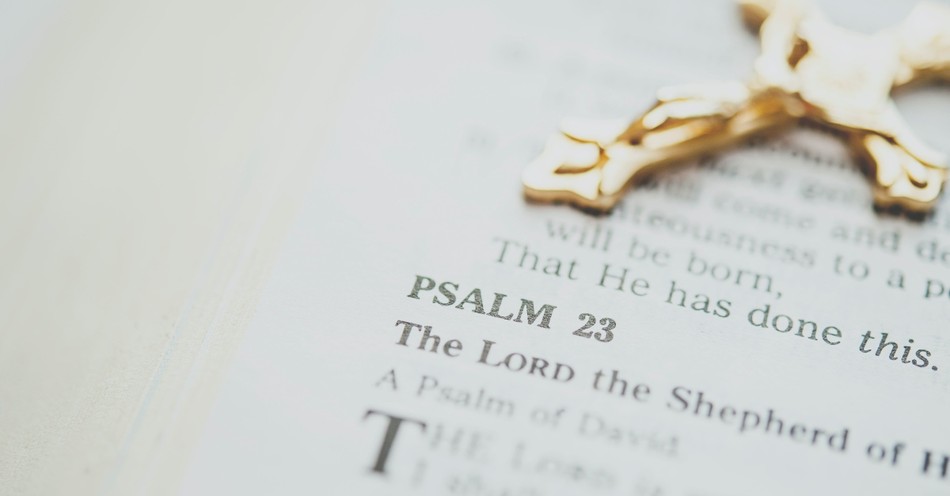Out of the 150 psalms written in the Bible, seven of these are traditionally known as the Penitential Psalms.
They express sorrow as a consequence of sin and the desire for repentance and removal of the source of affliction. The Penitential Psalms are also gratuitous towards the goodness and mercy of God.
Though not all of the seven Penitential Psalms correlate to personal transgressions, they recognize sin as the origin of strife and wrongdoing.
The Penitential Psalms are also referred to as the Psalms of Confession.
What Is the Origin of the Penitential Psalms?
Psalms were originally used for prayerful worship in the temple of Jerusalem. King David was the author of four of the Penitential Psalms.
In the Early Church, Psalm 51, (a psalm that is a plea for mercy), was prayed at the conclusion of morning services.
However, the term “Penitential Psalms” was first evident in the early fifth century through the works of theologian Augustine of Hippo. His philosophies and writings, in particular his autobiographical work, Confessions, made him one of the most influential figures of the Western Church.
As a result of his intense joy of the psalms and his incorporation of them into his ministry and prayer life, Augustine is attributed to categorizing four of the seven psalms as the Penitential Psalms.
In the sixth century, the Roman statesman and scholar of antiquity, Cassiodorus, identifies the seven Penitential Psalms in his famous work Expositio Psalmorum (Explanation of the Psalms).
Is There a Common Structure to the Penitential Psalms?
Each of the seven Penitential Psalms abides by a similar structure:
1The author issues a cry for help in the midst of his adversity (e.g. mercy, healing)
2A description of his current dire circumstances
3A specific request for help
What Psalms Are Referred to As the Penitential Psalms?
The following is a list and a brief summary of the seven Penitential Psalms:
1. Psalm 6. Psalm 6 is known as the first of the Penitential Psalms and was penned by King David.
Although the occasion for him writing this psalm is not clear, it is postulated that David wrote this psalm as a plea for God’s mercy while under His chastisement.
Psalm 6 is evidently an appeal for God’s grace and mercy and a desire for peace. The burdens of a dire situation and a weariness of mind are a heavy burden for the writer to bear.
However, the tone of the psalm changes to confident hope that God has heard his prayers, and it exudes a quiet assurance that God will cause his troubles to end and put his enemies to shame.
2. Psalm 32. This psalm, from King David, is one that expresses the joy of forgiveness, the security in having God as a hiding place, and the importance of receiving and following God’s instructions.
David shares with us the burden he feels when keeping his sins to himself: Not only does he experience physical manifestations of his guilt, but he strongly feels God’s displeasure.
His relief and happiness through God’s forgiveness of his iniquities urge him to tell us to confess our own transgressions to God, in order that we, too, may experience spiritual freedom and right standing with God.
3. Psalm 38. Psalm 38 was written by Kind David and gives insight into how God allows those He loves greatly to undergo trials and tribulations.
Psalm 38 lists the woes and toils that David is enduring at the time of writing this psalm. Not only is his physical flesh suffering at the hand of God’s displeasure, but his spirit is also undergoing trial through sins that are both new and reoccurring. As he writes, David’s soul laments as he recalls his iniquities.
However, instead of rejecting the author of his suffering, David turns to God, seeking repentance and putting all of his hope in the Lord.
4. Psalm 51. Psalm 51 was penned by King David after his desire for Bathsheba caused him to send her husband Uriah the Hittite to die on the front lines in a battle against the Ammonites. David then took Bathsheba as his eighth wife.
Therefore, Psalm 51 is an honest confession of David’s misconduct, revealed to him by Nathan the Prophet in 2 Samuel 12. Furthermore, Psalm 51 is a plea for God’s forgiveness, deliverance from bloodguilt and death, and a yearning to receive a cleansing of the heart.
David shows himself prepared to be broken by God in order to be in right standing with Him again. Additionally, David declares to God that through the restoration and joy of His salvation, he will sing forth praises to God and show other transgressors God’s ways.
5. Psalm 102. Psalm 102 differs from the other Penitential Psalms in that it describes the author’s confidence in God coming not only to his personal aid but also to the aid of his nation.
This psalm is included in the Penitential Psalms as it expresses the fragility of life and the limited time that we have on earth to pursue a godly life.
6. Psalm 130. Psalm 130 is the most well-known of the Penitential Psalms after psalm 51. It is also known as the “Gradual Psalm.”
The first four words of the psalm, “Our of the depths” reflects the author’s grief and is for that reason it is used in funeral rites.
However, despite the author’s lamentations, he knows that God hears his cries in the murkiest depths of his despair. He waits expectantly for the Lord and waits on His Word, aware that his own strength will not suffice to help him out of his troubles.
7. Psalm 143. Psalm 143 is the last of the Penitential Psalms written by David.
In this psalm, we find David in the midst of enemy oppression. However, despite the pressures he faces and the physical pain and spiritual guilt he endures, David recalls the good things that God has done for Him in the past.
David chooses not to rely on himself to solve his problems; instead, his dependence on God is evident. He calls upon God’s mercy in overcoming his enemies, calling himself God’s servant.
Are the Penitential Psalms Used in Church Services?
The Penitential Psalms have traditionally been used as prayers of reflection and repentance during Lent.
Although they are no longer officially commissioned, they are still very much in use in the Catholic church today, in particular, Psalm 51 (Have mercy on me, O Lord), and Psalm 130 (Out of the depths I cry to you, O Lord).
What Is the Most Recognized of the Penitential Psalms?
The most well-known of the Penitential Psalms is Psalm 51.
It is also referred to as “The Sinner’s Guide” as it provides clear directives for the sinner, who yearns to repent.
Are the Penitential Psalms Relevant for Christians Today?
Though the Penitential Psalms were written in response to situations and transgressions that were relevant at the time for its writers, the fact remains that man’s brokenness and aptitude for falling into sin has not changed over the centuries.
The need for repentance is a prevalent theme in both the Old and New Testament. With current world events reflecting end-of-time Bible prophecies, it is becoming all too evident for modern Christians to heed the call for repentance made by Isaiah, Jeremiah, John the Baptist, and even Jesus Himself.
How good then, that we can experience the complete forgiveness of our transgressions through the blood of Jesus Christ and stand in eternal righteousness with our Heavenly Father through faith by His grace.
Photo Credit: ©Unsplash/katherinehanlon

Madeline Kalu is an Australian Christian writer and the co-founder of Jacob’s Ladder Blog and The Proverbs 31 Home. She is also the co-author of the “My Year of Miracles 2024” journal, which encourages a daily reflection on the miracles that God performs in our lives throughout 2024. Madeline lives in Germany with her husband Solomon and the family’s two cats who were rescued from the Ukrainian war zone.



